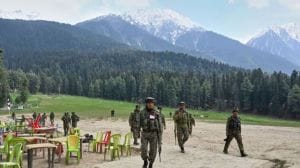Stay updated with the latest - Click here to follow us on Instagram
How Ranjani Srinivasan, Indian student at Columbia University whose visa US revoked, fled to Canada
Srinivasan’s situation is part of a broader crackdown by the Trump administration on pro-Palestinian demonstrators through the use of federal immigration powers. She is one of several noncitizens at Columbia University who have been targeted by Immigration and Customs Enforcement (ICE) in recent days.
 Over the past week, Srinivasan has grappled with the abrupt revocation of her visa and Columbia’s decision to withdraw her enrollment, a result of her legal status being terminated. (Photo: Ranjani Srinivasan via NYT)
Over the past week, Srinivasan has grappled with the abrupt revocation of her visa and Columbia’s decision to withdraw her enrollment, a result of her legal status being terminated. (Photo: Ranjani Srinivasan via NYT)It was a quiet Friday morning, eight days ago, when federal immigration agents first knocked on the door of a Columbia University apartment. The agents were searching for Ranjani Srinivasan, a student from India, who had recently learned that her student visa had been revoked by the US State Department.
Srinivasan, a 37-year-old Fulbright scholar pursuing a doctoral degree in urban planning, did not answer the door. She wasn’t home.
The next night, as federal agents returned, Srinivasan made a life-changing decision. She packed a few belongings, left her cat with a friend, and boarded a flight to Canada from LaGuardia Airport. Hours later, another Columbia student, Mahmoud Khalil, was arrested by federal immigration authorities in his campus housing, sending shockwaves through the university.
By the time the agents returned to Srinivasan’s apartment a third time—this time armed with a judicial warrant—she was already gone.
“The atmosphere seemed so volatile and dangerous,” Srinivasan said in her first interview since fleeing, speaking to The New York Times. “So, I just made a quick decision.”
A broader crackdown
Srinivasan’s situation is part of a broader crackdown by the Trump administration on pro-Palestinian demonstrators through the use of federal immigration powers. She is one of several noncitizens at Columbia University who have been targeted by Immigration and Customs Enforcement (ICE) in recent days.
Over the past week, Srinivasan has grappled with the abrupt revocation of her visa and Columbia’s decision to withdraw her enrollment, a result of her legal status being terminated. She had no prior indication of what was coming.
In a statement, the Department of Homeland Security (DHS) characterized Srinivasan as a “terrorist sympathizer” and accused her of advocating for violence in support of Hamas, which the US government designates as a terrorist organization. The claims, however, have been denied by Srinivasan’s legal team.
Kristi Noem, the Secretary of Homeland Security, took to social media to share surveillance footage of Srinivasan at LaGuardia Airport, referring to her departure as a “self-deportation.”
“It is a privilege to be granted a visa to live and study in the United States of America,” Secretary Noem posted on X, the social media platform formerly known as Twitter. “When you advocate for violence and terrorism, that privilege should be revoked, and you should not be in this country.”
It is a privilege to be granted a visa to live & study in the United States of America.
When you advocate for violence and terrorism that privilege should be revoked and you should not be in this country.
I’m glad to see one of the Columbia University terrorist sympathizers… pic.twitter.com/YTYXJgYFcp
— Kristi Noem (@KristiNoem) March 14, 2025
Srinivasan’s lawyers contend that her visa was revoked for engaging in “protected political speech” and that she has been denied due process to challenge the revocation.
What led to the situation
Srinivasan’s current situation stems from an incident last year during pro-Palestinian protests on Columbia’s campus. She was arrested near the entrance to the university’s grounds, not as a participant in the protest, but as she tried to return home after spending the day with friends. She was caught up in a chaotic scene as protesters clashed with police.
“I was just trying to get back to my apartment,” she recalled, describing how the police pushed her and detained her along with nearly 100 others. She was issued two court summonses, one for obstructing traffic and another for refusing to disperse. Her case was quickly dismissed and did not result in a criminal record.
Srinivasan said she did not disclose these summonses when she renewed her student visa, believing that since the charges had been dropped, they didn’t need to be reported.
 Pro-Palestinian demonstrator Mahmoud Khalil, second from left, debates with a pro-Israel demonstrator during a protest at Columbia University. (AP photo)
Pro-Palestinian demonstrator Mahmoud Khalil, second from left, debates with a pro-Israel demonstrator during a protest at Columbia University. (AP photo)
“Maybe that was my mistake,” she told NYT, adding that she would have been more than willing to provide the information if she had understood that she needed to.
ICE’s approach
According to immigration lawyers, it is rare for ICE to take the aggressive approach they have in Srinivasan’s case. Typically, visa revocations occur if someone overstays their visa, commits fraud, or has a criminal conviction. ICE operations targeting students on college campuses, particularly without clear evidence of wrongdoing, are highly unusual.
“It is more rare for the government to act the way it has, such as in the cases at Columbia University, where they’re going on campus and conducting an operation to apprehend somebody,” Greg Chen, a lawyer at the American Immigration Lawyers Association, told NYT.
Srinivasan’s legal team argues that she was targeted because of her speech and her limited social media activity, which included posts and shared content critical of the Israeli government’s actions in Gaza. She has signed several open letters supporting Palestinian rights but insists that she has never been part of any organized campus group.
“I’m just surprised that I’m a person of interest,” Srinivasan said during the interview. “I’m kind of a rando, like, absolute rando.”
Her ordeal began on March 5, when she received an email from the US Consulate in Chennai, India, informing her that her visa had been revoked. No reason was given, except a vague reference to “information” that had come to light.
After consulting with Columbia’s international student office, Srinivasan was advised that the revocation would only take effect if she left the country. For the moment, she could remain in the US to finish her studies.
But the following morning, March 7, federal agents knocked on her apartment door. Her roommate, another Columbia student, refused to let them in. Srinivasan abandoned the apartment that evening, anticipating more visits from federal authorities. She was not there when the agents returned.
 Mahmoud Khalil, center right, listens as members of the student protest negotiation team speak during a press conference near the pro-Palestinian demonstration encampment at the Columbia University. (AP photo)
Mahmoud Khalil, center right, listens as members of the student protest negotiation team speak during a press conference near the pro-Palestinian demonstration encampment at the Columbia University. (AP photo)
The Decision to flee
On March 14, Srinivasan received an email from Columbia informing her that her enrollment had been withdrawn due to her visa status. She was also required to vacate her student housing.
The email, sent by Columbia’s international student office, urged her to cooperate with DHS agents. That night, federal agents returned with a search warrant, entering Srinivasan’s apartment. By then, she had already crossed into Canada.
Now in Canada, Srinivasan faces an uncertain future. But she remains clear about one thing: her political speech, she believes, should not have led to this.
“I’m fearful that even the most low-level political speech can turn into this dystopian nightmare,” she said, “where somebody is calling you a terrorist sympathizer and making you, literally, fear for your life and your safety.”
(With inputs from NYT)
- 01
- 02
- 03
- 04
- 05































